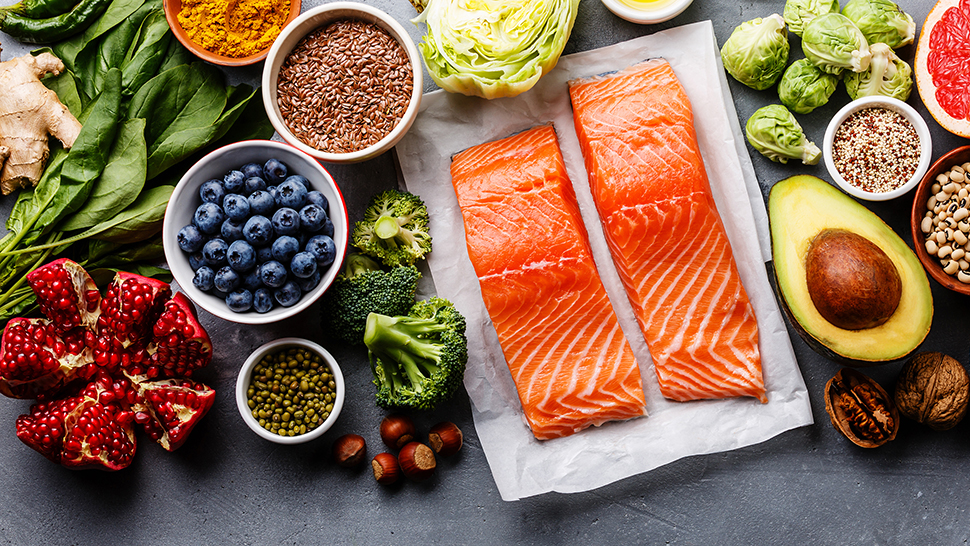
Anti-inflammatory has become a buzzword in the wellness world in recent years. Why are we all so obsessed with fighting inflammation? Traditionally, inflammation was talked about in relation to an injury — think swelling or redness at the injury site — which is known as acute inflammation. Chronic inflammation, however, is the more concerning type, and what’s getting everyone’s attention. Chronic inflammation can be a result of anything from poor gut health to carrying around too much visceral fat, or the type of fat that deposits around your organs, typically in the abdominal area. It has been linked to increased risk of diabetes, heart disease, some cancers, digestive disorders, and even autoimmune disorders. While an overall healthful diet filled with whole foods and few processed items is your best dietary defense against chronic inflammation, there are some foods that stand out as anti-inflammatory powerhouses.
- Berries: Full of antioxidants, berries of any kind contain phytonutrients called polyphenols that may reduce inflammation. Consumption of berries has also been tied to reduced risk of many inflammation-related diseases like metabolic syndrome and heart disease. Choose your favorite and top your morning oatmeal or yogurt, or just enjoy them as a snack.
- Fatty fish: Salmon, mackerel, sardines, and other fatty fish are rich in omega-3 fatty acids, which have been shown to have an anti-inflammatory benefit, particularly in relation to cardiovascular disease. Aim to eat two servings of fish per week and make at least one of them a fatty fish.
- Red grapes: Rich in resveratrol, an antioxidant that may reduce inflammation, grapes can be an inflammation-fighting snack. Toss them in a salad or freeze them for a sweet treat.
- Broccoli: Along with other cruciferous vegetables, eating broccoli has been tied to reduced risk of many inflammatory diseases. The presence of sulforaphane, an antioxidant shown to have anti-inflammatory properties, makes broccoli even more potent. Not a fan of this brassica? Try Brussels sprouts, cauliflower, or kale.
- Turmeric: The darling of the spice world, turmeric has gotten its fame from its link to fighting inflammation. A warming spice often used in North African and Indian cooking, turmeric can be added to anything from eggs and smoothies to soups and stews. Pair it with black pepper to get the most benefits. For more on this buzz-worthy spice, read here.
- Olive oil: Well-known for its role in the Mediterranean Diet, olive oil contains polyphenols that are linked to lowering inflammation and reducing risk of related diseases like heart disease and diabetes. Cooking with olive oil instead of butter is an easy way to combat inflammation.
- Mushrooms: These brown and white fungi often get overlooked when it comes to nutritious vegetables, but perhaps we should be giving them more credit. Mushrooms have been a key part of eastern medicine and may offer protection against inflammation. Lion’s mane mushrooms have even been shown to reduce inflammation among a group of obese adults. Lion’s mane mushrooms can be found at some farmer’s markets and grocery stores, but if you can’t find them, other mushrooms likely have similar benefits.
- Cherries: This sweet summer fruit has been shown to lower circulating levels of CRP, a blood marker of inflammation, among healthy men and women. While they are only found fresh in the warmer months, dried and frozen cherries offer similar benefits. Just look for ones that don’t have any added sugar!
- Tomatoes: Rich in the phytonutrient lycopene, tomatoes may help protect against cancer and reduce risk of other inflammatory related diseases. Lycopene is better absorbed when the tomatoes are cooked, so to get the anti-inflammatory benefits cook them into a sauce. Sauté the tomatoes in olive oil to double the punch.
- Avocado: Did you really need another reason to eat your #avocadotoast? Not only does this fruit contain heart-healthy monounsaturated fats, it also contains phytonutrients that have been linked to lower inflammation. Toast is just one way to enjoy this super fruit. Spread it on a sandwich, blend in a smoothie, or top your grain bowl with a few slices.
Fighting inflammation with your fork can be as simple as adding a few of these foods to your diet. For even more protection, follow a diet that emphasizes plant foods and limits processed foods and red meat.